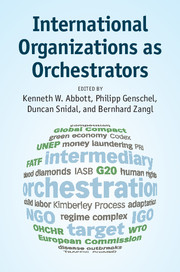Crossref Citations
This Book has been
cited by the following publications. This list is generated based on data provided by Crossref.
Abbott, Kenneth W.
Green, Jessica F.
and
Keohane, Robert O.
2013.
Organizational Ecology and Organizational Strategies in World Politics.
SSRN Electronic Journal,
Pegram, Tom
2014.
Governing Relationships: The New Architecture in Global Human Rights Governance.
SSRN Electronic Journal,
Schieder, Siegfried
2014.
Handbuch Internationale Beziehungen.
p.
1.
Marx, Axel
and
Wouters, Jan
2014.
International Informal Law-Making and Multi-Level Governance Intermediaries: the Case of National Contact Points Under the OECD Guidelines for Multinational Enterprises and Dispute Settlement.
SSRN Electronic Journal,
Abbott, Kenneth W.
2014.
International Organizations and International Regulatory Cooperation: Exploring the Links.
SSRN Electronic Journal,
De Búrca, Gráinne
Keohane, Robert O.
and
Sabel, Charles
2014.
Global Experimentalist Governance.
British Journal of Political Science,
Vol. 44,
Issue. 3,
p.
477.
Abbott, Kenneth W.
and
Bernstein, Steven
2015.
The High‐Level Political Forum on Sustainable Development: Orchestration by Default and Design.
Global Policy,
Vol. 6,
Issue. 3,
p.
222.
Blauberger, Michael
and
Rittberger, Berthold
2015.
Conceptualizing and theorizing EU regulatory networks.
Regulation & Governance,
Vol. 9,
Issue. 4,
p.
367.
Chan, Sander
van Asselt, Harro
Hale, Thomas
Abbott, Kenneth W.
Beisheim, Marianne
Hoffmann, Matthew
Guy, Brendan
Höhne, Niklas
Hsu, Angel
Pattberg, Philipp
Pauw, Pieter
Ramstein, Céline
and
Widerberg, Oscar
2015.
Reinvigorating International Climate Policy: A Comprehensive Framework for Effective Nonstate Action.
Global Policy,
Vol. 6,
Issue. 4,
p.
466.
Oberthür, Sebastian
2016.
Contested Regime Collisions.
p.
88.
Regan, Milton C.
2016.
Lawyers, Globalization, and Transnational Governance Regimes.
Annual Review of Law and Social Science,
Vol. 12,
Issue. 1,
p.
133.
Abbott, Kenneth W.
Genschel, Philipp
Snidal, Duncan
and
Zangl, Bernhard
2016.
Two Logics of Indirect Governance: Delegation and Orchestration.
British Journal of Political Science,
Vol. 46,
Issue. 4,
p.
719.
Henriksen, Lasse Folke
and
Seabrooke, Leonard
2016.
Transnational organizing: Issue professionals in environmental sustainability networks.
Organization,
Vol. 23,
Issue. 5,
p.
722.
Abbott, Kenneth W.
2016.
Orchestrating Experimentation in Non-State Environmental Commitments.
SSRN Electronic Journal ,
Gronau, Jennifer
and
Schmidtke, Henning
2016.
The quest for legitimacy in world politics – international institutions’ legitimation strategies.
Review of International Studies,
Vol. 42,
Issue. 3,
p.
535.
Roger, Charles
and
Dauvergne, Peter
2016.
The Rise of Transnational Governance as a Field of Study.
International Studies Review,
Vol. 18,
Issue. 3,
p.
415.
Abbott, Kenneth W.
2017.
Orchestrating experimentation in non-state environmental commitments.
Environmental Politics,
Vol. 26,
Issue. 4,
p.
738.
Koenig-Archibugi, Mathias
and
Macdonald, Kate
2017.
The Role of Beneficiaries in Transnational Regulatory Processes.
The ANNALS of the American Academy of Political and Social Science,
Vol. 670,
Issue. 1,
p.
36.
Bures, Oldrich
and
Carrapico, Helena
2017.
Private security beyond private military and security companies: exploring diversity within private-public collaborations and its consequences for security governance.
Crime, Law and Social Change,
Vol. 67,
Issue. 3,
p.
229.
Holzscheiter, Anna
2017.
Coping with Institutional Fragmentation? Competition and Convergence between Boundary Organizations in the Global Response to Polio.
Review of Policy Research,
Vol. 34,
Issue. 6,
p.
767.





